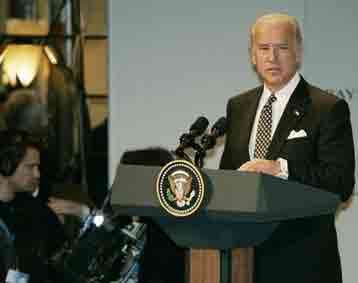All eyes on Biden as world leaders debate European security
 Munich - World leaders were looking for an insight into the new US administration's foreign policy Saturday as US Vice-President Joe Biden was set to address a VIP debate on issues ranging from NATO enlargement to Russian proposals for a new security treaty.
Munich - World leaders were looking for an insight into the new US administration's foreign policy Saturday as US Vice-President Joe Biden was set to address a VIP debate on issues ranging from NATO enlargement to Russian proposals for a new security treaty.
Biden was set to close a debate entitled "The future of European security" at the prestigious Munich Security Conference, which has gathered some 350 top politicians from around the world.
German Chancellor Angela Merkel, French President Nicolas Sarkozy and Polish Prime Minister Donald Tusk were all scheduled to speak in the debate, which analysts expect to provide a snapshot of the major foreign-policy flashpoints of the next few years.
Top officials from the European Union and NATO were set to discuss the complex issue of "NATO, Russia, oil, gas and the Middle East," a month after a row over natural-gas contracts between Russia and Ukraine led to widespread gas cut-offs across Europe.
Russian deputy premier Sergey Ivanov had been tipped to reply to them, but instead addressed the conference on Friday, calling on the US to work with his country on all questions of arms control.
Washington and Moscow are currently at odds over plans drawn up by former US president George W Bush to bring Georgia and Ukraine into NATO and to site parts of a missile-defence system in Europe, and over Russia's August invasion of Georgia.
In June 2008, Russian President Dmitry Medvedev called for a "new security architecture" to ease tensions in Europe by agreeing a treaty binding all European and North American states and security alliances to reject the use and threat of force.
Analysts in Europe say that Biden's speech could give an indication of how the new US administration of President Barack Obama intends to approach that question at a time when both one-time Cold War foes are reeling under the impact of the global financial crisis.
They also expect Biden to take a softer line on NATO enlargement and missile defence, while calling on Russia to reverse its aggressive policy towards its neighbours.
And they expect him to call on European states to commit more resources to the international mission in Afghanistan - although without putting too much pressure on Germany, which faces elections in September and which is deeply divided over the mission.
On Sunday the conference is expected to debate the future of the UN-mandated NATO mission in Afghanistan. (dpa)